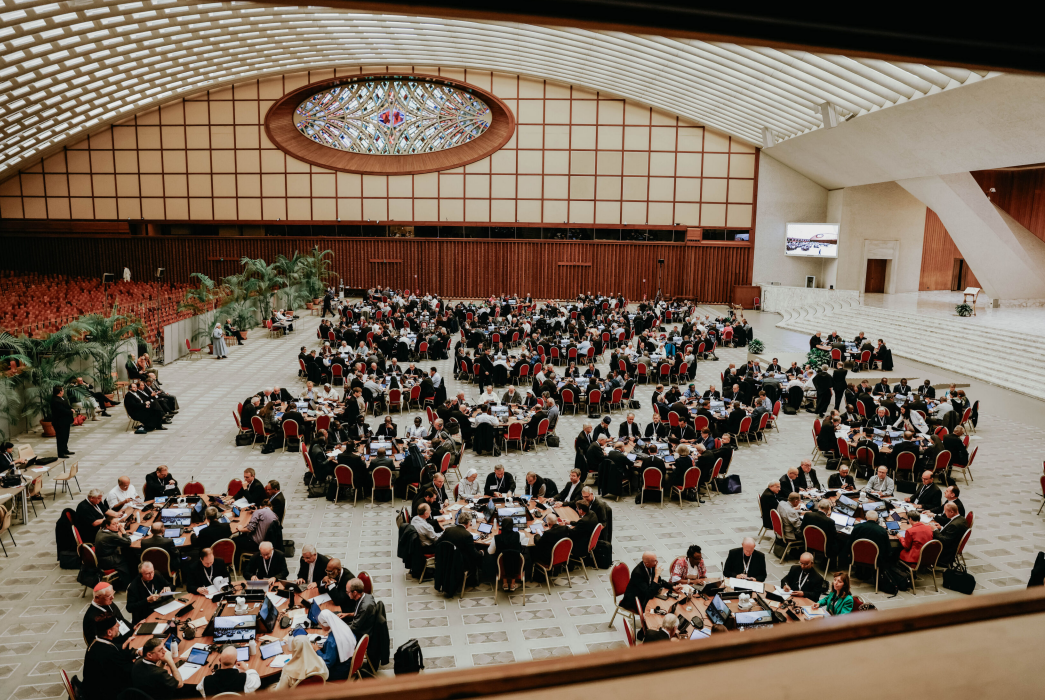.jpg)
.png) Dr Suresh Mathew
Dr Suresh Mathew

The 40-plus page report released at the conclusion of the first stage of the ‘Synod on Synodality’ on October 29 sets the tone for the final stage of the Synod to be held in October 2024. Approved by the conclave, the report enumerates many areas for the Church to move forward. The extraordinary synod, announced by Pope Francis and inaugurated on October 10, 2021, had stirred the Catholic Church for its suddenness and novelty of the theme, marking a milestone in its history. Now, the composition of the Synod too made it special -- of the 365 voting participants, for the first time lay people including 54 women had voting rights.
The Synod was preceded by an unprecedented two-year-long meetings starting at parish-level going up to national and continental gatherings. The purpose was to make the Church closer to people and less ‘bureaucratic.’ The very term ‘synodality’ was meant to initiate a process of walking together, coming together and listening to one another. Dialogue is to be an essential component before arriving at a decision.
The Synod report emphasizes the unity of the sacramental mystery and variety of liturgical traditions. This unity in diversity is further stressed when it says that Eucharist is meant to create harmony, not uniformity. In a major declaration, the report places ‘the poor at the centre of the Church’ and states that ‘learning from them (the poor) is something the Church needs to do more and more.’ Giving a new dimension, it cautions against viewing the poor as ‘objects’ of Church’s charity works; they are one with the Church as everyone else.
Aware of the conflicts among various Catholic Churches, the Synod amply makes it clear that ways must be found for a ‘visible and effective unity in diversity.’ It seems the Synod has ecumenical efforts in its mind when it suggests that “marriages between Christians who belong to different Churches or Church communities (mixed marriages) constitute realities in which the wisdom of communion can mature and we can evangelize each other.” There is a call for making the episcopal council and the diocesan pastoral council mandatory and for ensuring diocesan bodies more operational. It talks about the need for a fresh look at the canon laws though it is not clear the areas which would be covered by this exercise.
On the much discussed women’s access to diaconal ministry, there seems to be little headway as the report states that the issue has been left for further consideration at the next assembly of the Synod of Bishops. Though it says that “different positions have been expressed regarding women's access to diaconal ministry,” it admits that “Churches around the world have clearly formulated the call for greater recognition and enhancement of women's contributions in the pastoral responsibilities in all areas of the Church's life and mission.”
It seems the Synod has taken a leaf out of the sweeping changes Pope Francis made with the promulgation of the apostolic constitution Praedicate Evangelium (Preach the Gospel) last year, introducing far-reaching reforms in the Roman Curia, the topmost body of administration at the Vatican that assists the Pope in governing the Church. A beginning has been made with significant increase in the number of women in positions of responsibility in the Roman Curia. In the Synod too, the Pope gave lay people the right to vote on Church affairs for the first time. Therein lies a clear message for the Church in India to follow suit.